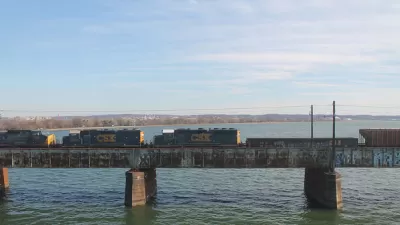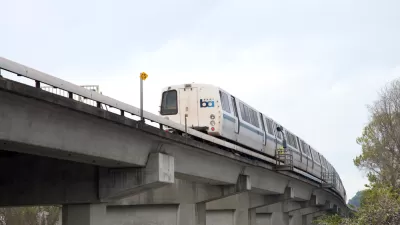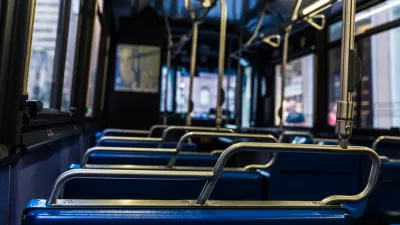Driving is down, transit ridership is up, but few are serisouly talking about how to improve America's transit system, according to this article from Grist, which wonders why.
"Locked into habits formed over decades of pro-auto policy, motorists doggedly faced down rising prices. Oil has since doubled in price again, and for the most part, the American public continues to motor away. Having busied ourselves building horizontal cities and eight-cylinder engines for decades, we are now woefully unprepared to do otherwise. Better to swallow hard, fill the tank, and hope the whole mess goes away."
"But behind our car addiction lies hopeful news. Americans drove 11 billion miles less this March than last March -- a 4.3 percent drop, and the steepest one-year reduction since 1942. In 2008, gasoline consumption is on pace to decline for the first time in nearly two decades. And transit ridership is up. Yes, in America."
"The ceaseless climb of oil prices, the growing financial toll of congestion, and the looming cataclysm of global climate change have not yet shaken the men and women entrusted with the care of our infrastructure to act -- or moved politicians, the press, and the public to demand action. Why can we not bring ourselves to speak of the need for better transit?"
FULL STORY: The Missing Links

Planetizen Federal Action Tracker
A weekly monitor of how Trump’s orders and actions are impacting planners and planning in America.

Congressman Proposes Bill to Rename DC Metro “Trump Train”
The Make Autorail Great Again Act would withhold federal funding to the system until the Washington Metropolitan Area Transit Authority (WMATA), rebrands as the Washington Metropolitan Authority for Greater Access (WMAGA).

The Simple Legislative Tool Transforming Vacant Downtowns
In California, Michigan and Georgia, an easy win is bringing dollars — and delight — back to city centers.

The States Losing Rural Delivery Rooms at an Alarming Pace
In some states, as few as 9% of rural hospitals still deliver babies. As a result, rising pre-term births, no adequate pre-term care and "harrowing" close calls are a growing reality.

The Small South Asian Republic Going all in on EVs
Thanks to one simple policy change less than five years ago, 65% of new cars in this Himalayan country are now electric.

DC Backpedals on Bike Lane Protection, Swaps Barriers for Paint
Citing aesthetic concerns, the city is removing the concrete barriers and flexposts that once separated Arizona Avenue cyclists from motor vehicles.
Urban Design for Planners 1: Software Tools
This six-course series explores essential urban design concepts using open source software and equips planners with the tools they need to participate fully in the urban design process.
Planning for Universal Design
Learn the tools for implementing Universal Design in planning regulations.
Smith Gee Studio
City of Charlotte
City of Camden Redevelopment Agency
City of Astoria
Transportation Research & Education Center (TREC) at Portland State University
US High Speed Rail Association
City of Camden Redevelopment Agency
Municipality of Princeton (NJ)





























